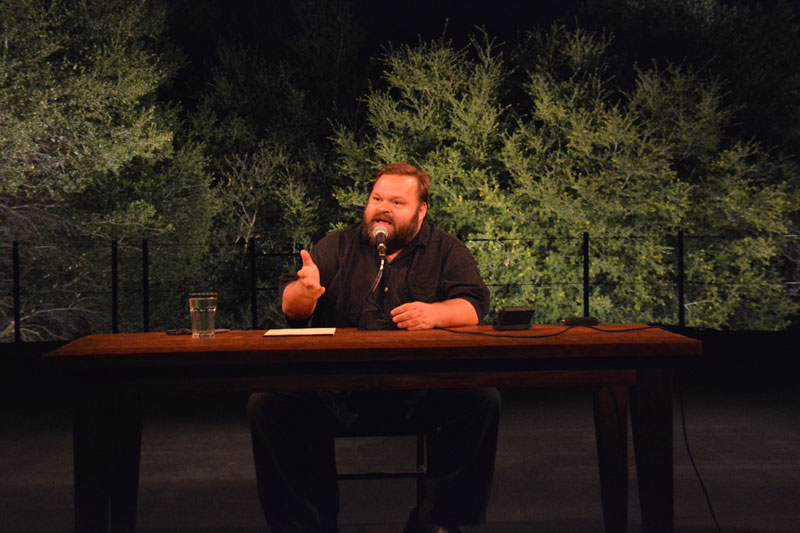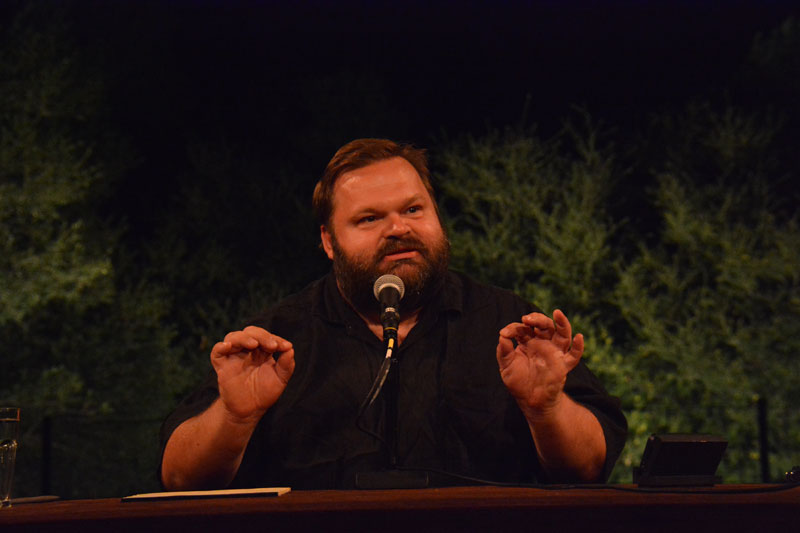Tragedy is one of the basic genres of drama, even if today it’s a term used mainly when talking about William Shakespeare or the ancient Greeks. According to Aristotle, tragedy inherently involves a reversal of fortune due to the hero making a terrible mistake. Bad stuff happening to you isn’t sufficient to make it a tragedy. Ultimately your downfall has to be your fault.
Public radio listeners know monologist Mike Daisey primarily for just such a mistake. In early 2012, This American Life aired portions of his monologue The Agony and the Ecstasy of Steve Jobs in which he recounted his trip to a Chinese factory where Apple products are manufactured. But it soon came to light that Daisey had made up certain details of his trip, taking the kind of poetic license that’s usual for a play but unethical when transplanted into a journalistic context where details must be factual and verifiable. This led to not just a retraction of the popular episode, but a full-length follow-up primarily about how pissed off host Ira Glass was about the incident, calling Daisey out on not just his initial poor judgment but for compounding the issue by not fessing up when first confronted with the discrepancies.
But Bay Area theater audiences know Daisey for much more — and much better — than that. Daisey has long been a frequent visitor to Berkeley Repertory Theatre with many solo shows that deftly blend his ostensible topics with philosophical musings and long autobiographical tangents that both illuminate the main subject and underscore why he cares so deeply about it: first 21 Dog Years, about working at Amazon.com, then The Ugly American, Great Men of Genius, and finally The Last Cargo Cult in repertory with The Agony and the Ecstasy in 2010. Daisey has been back since then, but not at the Rep. He performed his American Utopias show at San Francisco’s Yerba Buena Center for the Arts this May, and now he’s at California Shakespeare Theater with the world premiere of not one but four different shows, collectively titled The Great Tragedies, created especially to close the company’s 40th anniversary season.

Presented on separate nights with just two performances apiece, each show takes on one of Shakespeare’s most popular tragedies — Romeo and Juliet on Thursdays, Hamlet on Fridays, Macbeth on Saturdays and King Lear on Sundays — a progression that escalates in maturity and seriousness.
Daisey’s an old hand at juggling multiple monologues at any given time, sometimes workshopping a new show during the run of another. Great Men of Genius at Berkeley Rep in 2007 was also four interconnected monologues about Bertolt Brecht, P.T. Barnum, Nikola Tesla and L. Ron Hubbard. Each could be easily enjoyed on its own, but deeper themes and connections emerged when you saw them all. That’s certain to be the case with this series as well.


